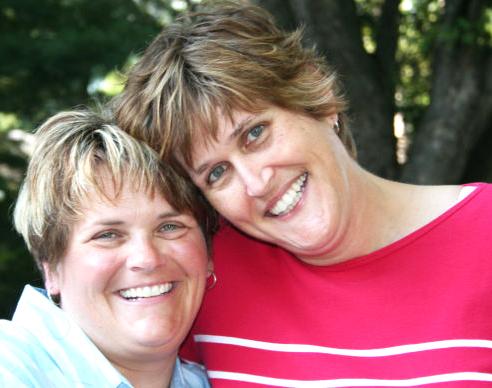Feb. 5, 2014
By Michael Riley
Two UW-Whitewater employees are among four couples named in a lawsuit filed Monday aiming to lift Wisconsin’s ban on same-sex marriage.
“We expect that this lawsuit will bring the freedom to marry to all Wisconsinites,” said Larry Dupuis, legal director of the American Civil Liberties Union of Wisconsin at a press conference. “We expect to demonstrate that Wisconsin’s refusal to allow marriages or to recognize out-of-state marriages of gay and lesbian couples violates the fundamental right to marry.”
Judith Trampf, 53, director of human resources at UW-Whitewater, and Katharina Heyning, 51, dean of the College of Education & Professionals Studies, have been registered as domestic partners since Aug. 5, 2009.
“We hope that our decision to become involved in the lawsuit will demonstrate to others that it is important to stand up and take action on issues you believe are important,” they wrote in an email to the Royal Purple.
The lawsuit states Trampf and Heyning have been together 24 years.
Trampf cites a medical emergency while on vacation in 2002 where Heyning experienced a seizure.
“The hospital told Judi [Trampf] that she could not make medical decisions for her, even though we had a power of attorney for health care stating that she had the right to,” they wrote in an email.
Hospital officials informed Trampf unless she had the health care power of attorney document in hand, she would not be allowed to make any medical descisions.
“They told her, that after 10 years of being together, Katy [Heyning’s] brother would be making decisions,” they wrote. “Judi [Trampf] felt horrible and helpless. There was nothing she could do, the person she loved most dearly was ill, and they were telling her she had no rights, even after 10 years of being together. It was very hurtful.”
Trampf’s authority to make medical decisions on Heyning’s behalf was challenged by the hospital because they were not married.
“We love each other, and denying us the freedom to marry just doesn’t seem right,” Heyning stated in the lawsuit.
Defendants listed in the lawsuit include Gov. Scott Walker and Attorney General J.B. Van Hollen, among others.
In a statement, Van Hollen said he plans to defend the Marriage Protection amendment, which passed with a 59 percent margin in 2006. The amendment declares gay marriage unconstitutional. Van Hollen did not say he will defend the case personally.
“This constitutional amendment was approved by a large majority of Wisconsin residents,” Van Hollen said. “I believe the amendment is constitutional, and I will vigorously defend it.”
ACLU has launched similar federal same-sex lawsuits in five other states, said John Knight, an attorney with the national ACLU’s Lesbian Gay Bisexual Transgender Project.
Knight said Wisconsin’s ban is especially terrible because it prohibits gay marriage and anything similar, including civil unions, and also makes it a crime for gay couples to go outside Wisconsin to marry under the state’s obscure marriage evasion law.
Since the 2006 same-sex marriage ban, the U.S. Supreme Court struck down the federal Defense of Marriage Act that banned same-sex couples legally married in their own states from receiving the same federal benefits as heterosexual married couples.
In an interview with Bloomberg News in November, Walker said the state has a healthy balance because while a constitutional amendment limits marriage to heterosexual couples, state laws ban discrimination based on sexual orientation.
Another couple in the lawsuit, Roy Badger and Garth Wangemann tell a story about complication in surgery, resulting in Wangemann being placed in a coma.
After four weeks, his partner, Badger, wanted to continue life support, but Wangemann’s father wanted to stop it.
Badger was able to make the final call only because Wangemann had granted his partner the power of attorney for health care.
“If we had been legally married, no one would have even questioned Roy’s involvement as my spouse,” Wangemann said of his partner of 37 years, in a press conference.
Trampf said even though she and Heyning had a commitment ceremony 10 years ago, being married would add legal and
societal recognition to their relationship.
“For me to be able to say I’m married to Judi; everybody knows what that means,” Heyning said. “It’s universal.”
Heyning and Trampf wrote in an email, “they hope that our decision to become involved in the lawsuit will demonstrate to others that it is important to stand up and take action on issues you believe are important.”












